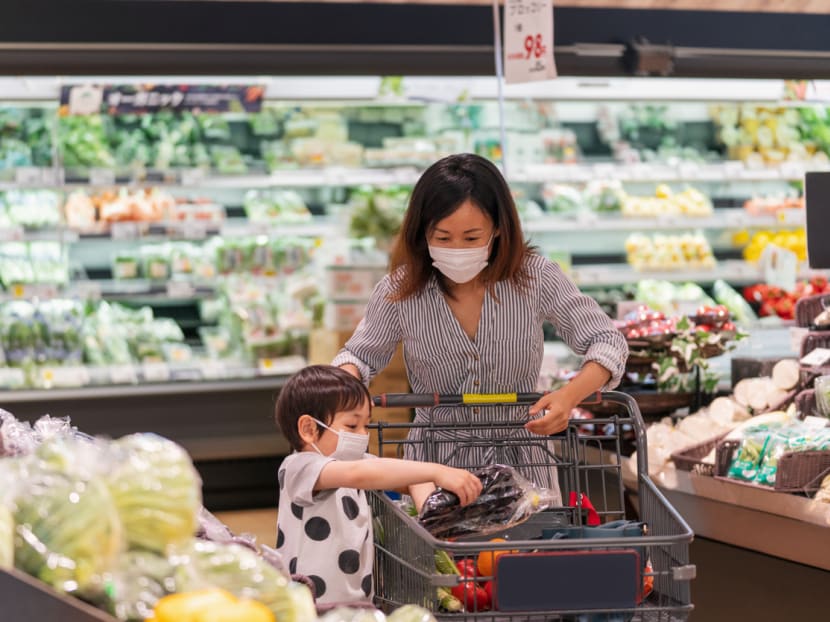Higher prices for petrol, electricity and food: How Russia's invasion of Ukraine might affect people in Singapore

Mother and son wearing face masks shopping together in a supermarket. (Photo: iStock)
SINGAPORE: Families and businesses in Singapore might see prices of some goods rise amid Russia’s invasion of Ukraine.
Pump prices for petrol and diesel, as well as the cost of electricity, will go up as a result of rising global energy costs due to the Ukraine crisis, said Minister for Trade and Industry Gan Kim Yong in Parliament on Monday (Feb 28).
Singapore imports most of its energy needs, and there has been a spike in the global prices of oil and natural gas in recent months, he added.
The crisis will also further strain global supply chains as Russia and Ukraine are major exporters of commodities like wheat, as well as metals like nickel and palladium, said Mr Gan.
CNA spoke to energy and finance experts to find out how the invasion of Ukraine will affect people in Singapore.
What is the link between the invasion and higher global energy costs?
Russia is a resource rich country, and about 40 per cent of natural gas consumed in Europe comes from Russia, said Dr David Broadstock, head of the Energy Economics Division at the National University of Singapore’s Energy Studies Institute.
It also sits in the top three oil producers and exporters.
“What this means is that Russia is a significant component of the global energy supply chain for two fuels, which between them make up for around 50 per cent of primary energy consumption,” he added.
The invasion is placing pressure on these supply flows, either because of physical supply chain disruptions, tightening sanctions, or other trade restrictions, said Dr Broadstock.
Assuming that global demand for energy remains largely unchanged, there is a reduction in supply, he said.
“To satisfy the same level of energy consumption, countries will need to increase purchases from other countries than Russia,” he said.
“Assuming Russia was in the market because it was cheaper to purchase from them, when they are not in the market, means turning to other presumably higher-priced producers – hence costs go up.”
It is important to also recognise that expectations impact markets, he added.
“Expectations become hard to forge at times like this, and such uncertainties are rarely priced as a discount, adding to the upward price pressure,” he said.
Related:
How will this translate into higher prices in Singapore?
The impact of the Ukraine crisis goes beyond oil and gas prices, since oil and gas are "intermediate inputs" into the broader energy supply chain, said Dr Broadstock.
“Oil converts to gasoline, and gas is widely used in the production of electricity. This is especially true in Singapore, where around 95 per cent of electric power generation is based on natural gas,” he said.
A rise in the price of oil means that making petrol or diesel is more expensive, he said, noting that while Singapore is transitioning to clean energy vehicles, petrol and diesel are still used pervasively.
“By the same logic, an increase in the price of natural gas makes the cost of producing electricity higher. There may be little room to navigate these increases in the short term,” he said.
Associate Professor Chen Tao from Nanyang Technological University’s Nanyang Business School said that the increase in petrol and electricity prices can be attributed partly to the “soaring price” of raw materials, including crude oil and natural gas.
Additionally, demand for petrol and electricity continues to rise as the global economy recovers from the COVID-19 pandemic, he said.
“In short, the imbalance between supply and demand in the global energy market helps translate higher global energy costs into higher petrol and electricity prices,” he said.
What other commodities could be directly impacted?
Assoc Prof Chen said that the conflicts will exacerbate strains in global supply as Russia and Ukraine are major exporters of commodities like wheat, metals, fertilisers, rare gases and other industrial raw materials.
“Russia and Ukraine together produce nearly a quarter of the world’s wheat, which are also major exporters of barley, corn and sunflower seed oil, among other products,” he added.
“And tensions between the two countries could disrupt prices in the global food market by increasing agricultural production costs related to fuel and fertiliser, destroying farmers’ harvest, as well as pulling up the relevant transport prices.”
Supply disruptions will push up the prices of metal commodities as well as prices of goods made from these commodities, he noted.
Russia accounts for 49 per cent of global exports of nickel, 42 per cent of palladium, 26 per cent of aluminium and 13 per cent of platinum. The country is also a “significant exporter” of steel and copper.
Ukraine supplies 70 per cent of the world's neon, 40 per cent of krypton and 30 per cent of xenon, which are important materials in making microchips.
“Disruptions in the supply of these commodities could have a major impact on the manufacturing sector, involving the production of stainless steel, sensors, semiconductors, as well as chips,” he said.
Quite a few commodities like agricultural products are grown in both Russia and Ukraine, said Assistant Professor of Finance at Singapore Management University Aurobindo Ghosh, adding that Ukraine is one of the largest suppliers of food grain, second only to the US.
“Food prices could see a triple whammy from increased fuel prices, reduced production due to conflict and delivery bottlenecks and supply chain problems related to the consequent sanctions,” he said.
Russia and Ukraine together export a quarter of the world’s wheat and Ukraine is also a major exporter of corn, he noted.
“A pause to manufacturing and production can lead to higher prices. Moreover, higher cost of natural gas, which is the main component in fertilisers, could push the crop prices up,” said Dr Ghosh, who is also the principal investigator of the DBS-SKBI Singapore Index of Inflation Expectations project.
How soon will the impact be felt?
Dr Ghosh said that while most countries have strategic reserves for food and other essential supplies, in land-scarce countries like Singapore, “it is difficult to do so for long periods, particularly for perishable items”.
“The price of petrol will be felt soon in the petrol stations as well as an increase in prices of some food items, if no action is taken,” he said.
“Having said that, there are steps being taken to release more strategic reserves of oil both from individual countries like the US as well as by OPEC+ producers.”
Dr Broadstock said that some economic impacts are already filtering through in terms of reports on higher petrol prices in some jurisdictions, but the broader range of effects will take a "little longer" to appear.
Supply chains typically operate in weeks or months, and it will be important to separate the impact of unavoidable short-term shocks from more manageable long-term market reconfiguration, he added.
“As such the next two months or so will become very revealing as to the trajectory of such durable impacts,” he said.
“What is hard to calibrate today is whether we are sitting in front of a contained conflict, or on the verge of something bigger,” Dr Broadstock added.
“Signals are worryingly tracking in the direction of the latter. Due to this, we are witnessing an unprecedented level of sanctions, military posturing and political rhetoric that clearly will take time to calibrate. But it has only been about a week since events began.”
Assoc Prof Chen said that although the price of commodities of energy, agriculture, and industrial raw materials has fluctuated sharply as the conflict intensifies, the “real test is still to come”.
“The production process allows producers to absorb price shocks and gradually pass them to consumers, and the transmission time of the impact depends largely on the production cycle of different products,” he added.
“For example, according to David Laborde, a senior research fellow at the International Food Policy Research Institute, the real impacts on the global food supply would be felt in four months, when the next wheat harvest would begin.”
How long will the effects of the invasion last?
The crisis has years-long foundations and has triggered economic sanctions that will have “years-long consequences”, said Dr Broadstock.
“There seems no ambiguity that these will endure beyond the cessation of hostilities,” he added.
“Given the complexity of Russia’s pretext for sending troops into Ukraine, and the deep disdain voiced by other nations towards the move, it would however be speculative to predict how long the effects will last.”
Related:
While prices will settle in the future, at least to the extent that markets are normally settled, whether they will settle at or near the same price levels seen in the past remains to be seen, he said.
Assoc Prof Chen agreed, adding that prices may not settle down after the Ukraine crisis ends. Plants and production lines, as well as port facilities and railroads damaged in the invasion, cannot be put into use immediately, he said.
This will still limit global supply after the crisis, he added.
How should people and businesses brace themselves?
Dr Ghosh said people should be prudent when making their purchasing and consumption decisions and not panic about supply crunches as Singapore has a well-diversified supply chain.
It is "worthwhile" for smaller companies to invest in alternative sources of supply in case the disruption is longer term, he said.
“Finally, the policymakers across the world might also review the stance on monetary policy tightening or interest rate increase in view of a longer-term impact of geopolitics on consumers and investors,” he added.
Dr Broadstock urged people to be frugal with spending, calling it a “sensible basis for prudent financial planning”.
“At a broader economy-wide level of thinking, accelerating the energy transition will help shield the economy from sustained increases in oil and gas prices, as will other initiatives already underway or under review for importing low-carbon energy,” he added.
“Faster uptake of circular-economy principles and development of facilitating market mechanisms would help grow locally driven economic activity.”
While such “bigger picture initiatives” will not emerge overnight, the sooner progress is made, the faster the benefits can be reaped, he added.
“The Ukraine crisis offers a compelling impetus for intensifying our efforts,” he said.





